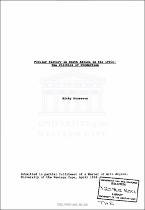| dc.description.abstract | Popular history, like indeed other histories, is informed by different ideas about the relationship between the past, the present and the political uses of history. However, a major problem in trying to explore these ideas as they developed in South Africa in the period under review, is that they remain for the large part embedded in popular history texts. A consistent and conscious theorisation has not been much evident - at least not at a published level. The triennial conferences of the WHW are thus perhaps unique in the opportunity they accorded to projects to reflect on their experiences and more generally to raise issues and debates relating to popularisation. At the same time, and perhaps precisely because it was one of the few arena6 where such reflection was happening, the relative paucity of research to emerge from these quarters is particularly regrettable. while not all would agree with Crais' assertion that the programmatic separation of the
popularisation section2 from the mainstream academic one resulted in "exclusionary practices"3, it does seem undeniable that they enjoyed a different and lesser status. | en_US |

